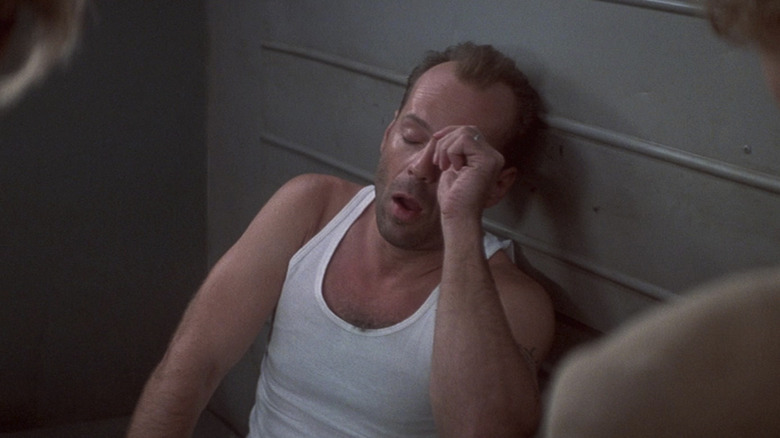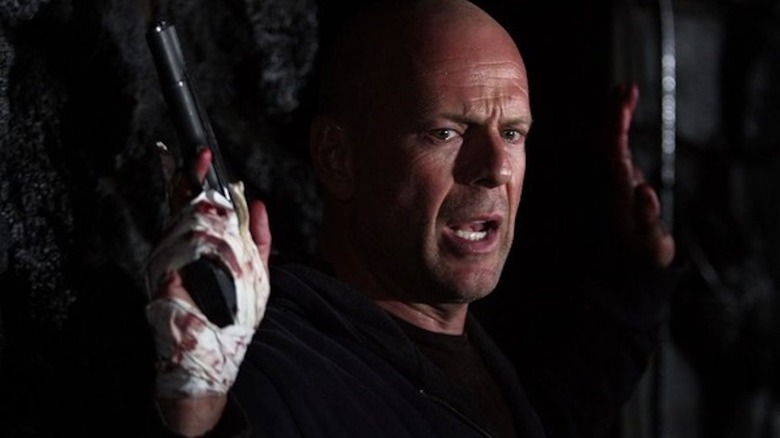The Genuine Reason Why Bruce Willis Became Frustrated With Movies Like Die Hard
When Bruce Willis became a television star 40 years ago via the hit ABC comedy "Moonlighting," no one in the entertainment industry thought he was primed to become the next great action movie hero. As wisecracking private detective David Addison, he seemed poised to be a romantic comedy lead in the old-fashioned vein of Cary Grant or, at the very least, a rakish successor to Paul Newman. He did not, however, give off the gun-toting beefcake vibes of guys like Sylvester Stallone or Arnold Schwarzenegger. So when he snared a then-unthinkable $5 million payday to star in "Die Hard" after just about every star in Hollywood passed on the role of John McClane, a folly appeared to be in the offing.
All Willis did with "Die Hard" is completely readjust the industry's expectations for action films. Instead of a musclebound killing machine, he was an everyman cop who uses his wits as much as his facility with firearms to take down a band of heavily armed thieves. Moviegoers were hooked on this newfangled approach to action filmmaking, but the industry looked to replicate the form of "Die Hard" rather than its humanity. While clones like "Under Siege," "Passenger 57," and "Speed" began to proliferate, Willis gamely returned for two "Die Hard" sequels and, to keep his red-meat-craving fans sated, sought out gruff-and-quippy riffs on the McClane persona. Some of these were great ("The Last Boy Scout"), and some were "Striking Distance."
Ultimately, after a decade-plus of bullet-whizzing derring-do, Willis took a break from the genre. What caused him to temporarily turn his back on the types of films that made him a movie star?
Bruce Willis had his fill of John McClane
In a 2005 interview with the BBC tied to the release of Florent Siri's underrated "Hostage," Willis noted that the iteration of the genre that boosted his career was nothing more than the latest version of stories writers have been spinning since the days of Homer. Per Willis:
"[W]hat we call action movies now are nothing more than what they used to call cowboys-and-Indians movies, then they called them gangster movies, then they called them WWII movies and Korean war movies and Vietnam movies and cops-and-robbers. It's all just stories about good triumphing over evil. And look, this goes back to the Greeks. They were telling the same kinds of stories and Shakespeare was telling those stories. That's what these films are and when I did the first 'Die Hard' and Mel Gibson did the first 'Lethal Weapon' we both set templates for the modern version of good guys versus bad guys."
I get Willis' overall point, but I'm not sure, say, Vietnam War movies were about "good triumphing over evil." In any event, what put him off the movies for a period of time? "Over 15 – 20 years that kind of got done so much ... it just got bastardized," said Willis. "It was 'Die Hard on a plane,' 'Die Hard at the White House,' 'Die Hard at a Delicatessen,' 'Die Hard' everywhere! I just got sick of it. I got sick of running down a street with a gun in my hand going, 'NOOOO!'"
While "Hostage" was considered by some a return to action heroism for Willis, he correctly thought it was more of a psychological thriller. It has shades of "Die Hard" in that it's mostly set in one location (a house), but there's little in the way of levity to go along with the movie's graphic violence. Alas, when "Hostage" proved a commercial disappointment, Willis retreated to the safety of the "Die Hard" franchise and made two wildly inferior sequels. Then came a spate of direct-to-DVD cheapies that were depressingly unworthy of Willis' talents. It's heartbreaking that his declining health has forced him into retirement, but his late-career for-hire work will be quickly forgotten, while his many triumphs will be treasured forever.

